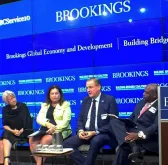“Think of [Volunteers] as the amino acids of the Sustainable Development Goals,” said Richard Dictus, Executive Coordinator of the United Nations Volunteers (UNV) programme, addressing the 10th Anniversary International Forum for Volunteering in Development held at the Brookings Institution in Washington on 14 June 2016.
The UNV EC said that through UNV, Peace Corps and other volunteer organizations, “Volunteers from all over the world can become catalysts. Volunteerism is a way to put new and additional accountability measures in place, where people get to speak their mind, participate in decision-making and participation in implementation.”
The 2016 forum, entitled International Volunteering and the 2030 Development Agenda: Forging Global Development Outcomes, Research and Alliances, was sponsored by the Building Bridges Coalition (BBC), a consortium of organizations promoting international volunteering launched at the Brookings Institution in June 2006.
The forum had three objectives: to convene a high profile forum and raise awareness, particularly in the US, of the role of volunteers in achieving the UN’s Sustainable Development Goals for 2030; to provide a multi-stakeholder platform to advance innovative global alliances between US and international NGOs, faith-based entities, university consortia and the private sector, and to engage policymakers on the benefits of international service and policy options for the next US Administration.
“If we are going to be the generation that basically ends poverty, if we are going to be the generation that leaves no one behind, if we are going to unleash the transformative capacity of people to save the planet, we need volunteers, because you can’t do it without volunteers. It’s really as simple as that,” said the UNV Executive Coordinator.
Sitting on the panel exploring the Role of Volunteer Service in Achieving the 2030 SDGs, Richard Dictus promoted UNV as an outstanding resource and shared some of the organization’s best practices as well as results of research on the impact of volunteering. The panel was moderated by Corey Griffin, a BBC Board Member with the National Peace Corps Association, and included Diane Melley, Vice President for Corporate Citizenship Initiatives with IBM and an Executive Committee Member with Impact 2030, Carrie Hessler-Radelet, Director of the U.S. Peace Corps, and Susan Reichle, a Counselor with the U.S. Agency for International Development.
The UNV Executive Coordinator took the opportunity to engage with participants and discussed ways in which UNV could assist their organizations with assessing the effectiveness of international volunteering programs, and developing international volunteering opportunities for their organizations.
The keynote address was given by retired US Army General Stanley McChrystal, chairman of the Service Year Alliance, who has been promoting a year of civilian service as a part of every young American’s life. The Service Year Alliance, with which he is affiliated, is a bipartisan organization working to make this vision a reality.
The BBC was launched at the Brookings Institution in June 2006 with former Secretary of State Colin Powell as the keynote speaker. Considered a leading advocate of international volunteer service, the BBC has seven working groups focusing on effective practices, research and university engagement, the SDGs, health, corporate engagement, faith-based engagement and technology and communication.
The Brookings Institution is a nonprofit organization devoted to independent research and policy solutions. Located in Washington, D.C., its mission is to conduct high-quality, independent research and, based on that research, to provide innovative, practical recommendations for American policymakers and the public.

